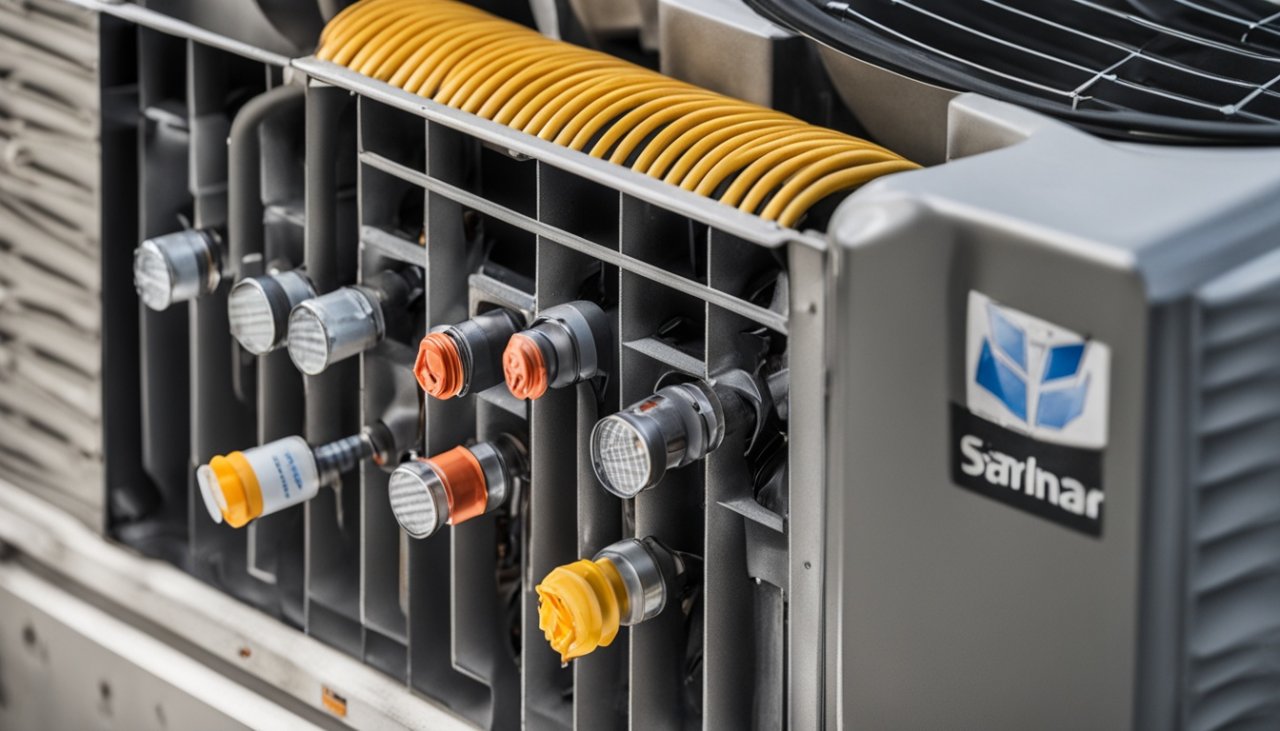Ever thought about how HVAC maintenance contracts could affect your profits? In the world of HVAC service agreements, managing them right can make your work smoother and boost customer happiness and profits. As HVAC maintenance grows in importance, knowing how to handle these contracts is crucial. In this article, I’ll give you tips and strategies to make the most out of maintenance agreements.

Key Takeaways
- HVAC maintenance agreements can lead to increased income and profitability for HVAC businesses.
- Establishing HVAC service contracts helps convert one-time emergency repairs into repeat customers.
- Quarterly maintenance visits provide technicians with more jobs during slower seasons.
- Service contracts facilitate face-to-face interactions, enhancing customer relationships.
- HVAC maintenance agreements offer opportunities for upselling add-on services and upgrades.
- Selling HVAC agreements during peak seasons improves scheduling efficiency.
- Incentives for technicians to sell maintenance contracts can boost company profits.
Understanding HVAC Maintenance Contracts
For homeowners and business owners, understanding HVAC maintenance contracts is key. These contracts make sure HVAC systems get the care they need. This leads to better performance and saves energy. The contract is a legal deal that spells out what services are offered and how maintenance will be done.
Definition and Purpose
HVAC maintenance contracts help prevent sudden breakdowns, giving peace of mind with regular check-ups. They help avoid expensive fixes and keep systems running well. Most plans include seasonal maintenance for both heating and cooling systems all year.
This is great for people living in harsh climates or families with members who need comfort and fast repair help.
Types of HVAC Maintenance Contracts
There are many types of HVAC service agreements, each fitting different customer needs. Options range from yearly to bi-annual plans, and even custom ones for homes or businesses. Bundling services can save money compared to paying for each one separately.
Some plans focus on routine maintenance, but major repairs and parts are usually not included. The type of system and warranty can mean some plans might offer too much coverage. This lets customers choose the best plan for their needs and budget.
Benefits of HVAC Maintenance Contracts
Investing in HVAC maintenance contracts brings big benefits to my business. It helps increase revenue and keeps customers coming back. Regular maintenance is key to building strong HVAC relationships, which leads to more business in the future.
Increased Revenue and Retained Customers
Regular maintenance means a steady income and happy customers. It makes my customers loyal and helps my business grow. Plus, I can sell more services during checkups, which brings in more money.
Consistent Workflow for HVAC Technicians
Having reliable contracts keeps my technicians busy all year. They don’t have to worry about slow periods. This means they’re happier and more productive, fixing fewer emergencies.
Improved Customer Relationships
Building strong customer relationships is crucial for my success. Regular maintenance lets my team understand each customer’s needs. This builds trust, making customers more likely to stay with me and recommend my services. It also boosts our reputation in the industry.
Key Components of an HVAC Maintenance Contract
Creating a good HVAC maintenance contract needs focus on key parts. It’s vital to include HVAC maintenance contracts components that make things clear for everyone. This avoids confusion and keeps things running smoothly.
Essential Elements to Include
An HVAC maintenance contract should have important parts like a list of services, how often they’ll be done, and what supplies are needed. It should also cover labor costs for yearly visits and any extra fees for emergencies. This makes everything clear, preventing misunderstandings and making sure maintenance is fully covered.
Service Level Agreements
Adding service level agreements (SLAs) to your HVAC contract is key. These set the standards for service, like how fast emergencies are handled and regular upkeep. They make sure both the service provider and the client know what’s expected, keeping everyone in agreement on quality and duties.
Payment Terms and Conditions
Setting HVAC contract payment terms in your agreement makes finances clear. You can choose flat fees, installments, or both. Being clear about costs lowers the chance of disagreements. It’s also important to say how payments work and what’s included in the maintenance, like how often they come and what parts are covered. This careful planning helps protect both sides and builds strong relationships over time.
Choosing the Right HVAC Service Agreement
Choosing the right HVAC service agreement is key to keeping my system running well. I look at the type of property, how often I need service, and my budget. These factors help me pick a plan that works best for me.
Factors to Consider
Properties need different types of plans. For homes, I focus on preventive maintenance to keep systems efficient all year. Commercial buildings need more frequent checks due to their complex systems. Knowing what my property needs helps me find the right agreement.
Comparison of Residential vs. Commercial HVAC Contracts
Home contracts usually offer two maintenance visits a year, before the hot and cold seasons. This helps prevent expensive repairs. Members of these plans get 10% to 20% off repair costs, making it a smart choice.
For businesses, maintenance is needed every 90 days for the best performance. Knowing these details helps me pick the right plan for my needs.
Streamlining HVAC Maintenance Management
In today’s HVAC market, being efficient gives you an edge. Using new tools and strategies for HVAC maintenance helps meet customer needs better. It also makes services better. The right methods make things easier for both technicians and managers.
The Role of Service Management Systems
Service management systems are key to making HVAC operations better. They help with scheduling, billing, and talking to customers, cutting down on paperwork. For example, mobile apps with customer info and contracts let technicians quickly find what they need, ensuring fast service.
These systems also help with checking how well things are going and finding ways to get better. This leads to more efficient work.
Implementing Automation for Efficiency
Automation in HVAC services reduces manual work and makes customers happier. AI helps streamline work, use resources better, and predict when maintenance is needed. This means less equipment breakdowns and less unexpected downtime, which is important in a busy world.
Training staff on new tech and ways of working shows how important it is. Well-trained technicians improve service quality and make the workplace better for everyone.
Tracking HVAC Maintenance Contracts Effectively
Keeping track of HVAC maintenance contracts needs an organized plan. Using mobile apps for HVAC makes managing these contracts easier. Technicians can update client records right away, cutting down on mistakes and making sure services are correct. This tech helps my team and clients talk smoothly.
Utilizing Mobile Applications
Mobile apps for HVAC make managing contracts easy. I can check records, set up services, and answer client questions quickly. These apps help me work more efficiently, building trust and strong customer bonds.
Keeping Accurate Records
Keeping accurate HVAC records is key for my business to thrive. Up-to-date records help me handle contract renewals and spot trends in service needs. This careful record-keeping extends equipment life, saves clients’ money, and meets all contract rules. Having clear, organized data means I can offer top-notch service and keep clients happy.
![]()
Communication with Clients: Keeping Them Informed
Talking well with clients in HVAC builds trust and makes customers happy. It’s key to explain HVAC services clearly. This way, clients understand the value and need for the services.
It’s important to use simple language. This makes clients feel more at ease and informed about the work.
Explaining the Services Provided
Explaining HVAC services well can change how clients see my business. Clear explanations make the process easier to understand. I like to go into details about maintenance, repairs, and possible issues.
This helps clients get a better grasp of their systems. It leads to fewer misunderstandings and more satisfaction.
Encouraging Customer Feedback
Getting feedback from customers is key to improving service. After each job, I ask clients what they think. This feedback helps me see where I can get better.
It shows I care about customers. Regularly checking in on feedback helps me improve and build stronger relationships. This is crucial in HVAC where trust is everything.
Scheduling and Appointment Management
Effective scheduling and appointment management are key in an HVAC business. Using technology for scheduling helps me manage appointments better. This ensures regular maintenance gets top priority while being quick to respond to emergencies. An integrated system makes managing HVAC schedules and tracking client appointments easy.
Utilizing Technology for Scheduling
Systems like Joblogic automate important tasks like work orders and invoicing. This automation makes me more efficient, letting me focus on quality service. Mobile apps give me real-time access to client notes, reducing errors and boosting customer satisfaction.
Real-time info lets me customize services for each HVAC system. This approach encourages customers to come back for more.
Managing Emergency Service Calls
In the HVAC world, fast response is crucial, especially in emergencies. Good emergency HVAC service management means urgent needs get quick attention without ignoring regular clients. Advanced scheduling tech helps me plan routes and make smart decisions with real-time data.
Email reminders and notifications keep customers updated on maintenance. This keeps a steady stream of service contracts and builds loyalty.
Pricing Strategies for HVAC Maintenance Agreements
Setting the right prices for HVAC contracts is more than just about numbers. It’s important to know the market rates to stay competitive. Preventive maintenance agreements are usually the cheapest, while full coverage contracts cost the most. The type of equipment and how often it needs maintenance also affects the price.
Understanding Market Rates
Prices for HVAC contracts vary based on the system’s size, how easy it is to reach, and the maintenance tasks needed. Preventive maintenance costs depend on the time needed and the hourly rate of the company. It’s smart to compare the hours worked against the total cost of the contract.
A well-kept system works better for longer and costs less in the long run. This affects the price of maintenance agreements.
Creating Value-Driven Packages
Offering HVAC packages that save money and give priority service can draw in customers. These packages meet different customer needs and boost sales. Setting prices should consider the value given to customers, not just competition.
When making these packages, I look at past service costs and predict future changes in prices. It’s key to make the agreement flexible, letting either side end it if needed. This keeps the relationship positive, lasting beyond the contract.
Legal Considerations for HVAC Contracts
Creating HVAC maintenance contracts means looking closely at legal details. It’s important to understand HVAC contractual clauses and follow local laws. These steps protect everyone involved and keep things running smoothly.
Understanding the Importance of Contractual Clauses
Well-written HVAC contracts make things clear. They cover services, payment, and who does what. Including rules about who is responsible and how to end the contract helps avoid problems. This makes working together easier and builds trust.
Compliance with Local Regulations
Following local laws is key for HVAC contracts. Each place has its own rules for HVAC work. I make sure my contracts follow these rules, including things like F-Gas certification for technicians. This keeps things legal and builds trust with my clients.
Conclusion
Managing HVAC maintenance contracts is key to making customers happy and making your business run smoothly. This article has shown how to make HVAC service agreements that meet each customer’s needs and improve your operations. By doing regular checks, offering quick emergency help, and having full service packages, HVAC pros can cut down on unexpected costs. This also ensures top-notch service.
Regular maintenance through contracts has more than just easy benefits. It makes HVAC systems work better, which means lower energy bills and longer-lasting equipment. Adding things like priority service and small repair coverage builds trust with customers. This leads to stronger relationships with clients.
In the competitive HVAC field, knowing how to use HVAC maintenance contracts is crucial. I suggest that professionals pay attention to the services they offer and keep in touch with clients about their systems. This approach leads to lasting practices that make your business profitable and keep customers happy over time.
See how FieldAx can transform your Field Operations.
Try it today! Book Demo
You are one click away from your customized FieldAx Demo!
FAQ
What are HVAC maintenance contracts?
HVAC maintenance contracts are agreements that ensure your HVAC systems get regular check-ups. They help prevent sudden breakdowns and offer peace of mind with scheduled services.
What are the benefits of having an HVAC service agreement?
HVAC service agreements bring steady income, keep customers coming back, and improve relationships. They lead to loyalty and more referrals over time.
How often should HVAC maintenance services be performed?
How often you need HVAC maintenance depends on your system and the agreement you have. Options include yearly, twice a year, or seasonal services for homes or businesses.
What should be included in a typical HVAC maintenance contract?
A good HVAC maintenance contract should list what services you’ll do, how often, and the payment details. It should also have a Service Level Agreement (SLA) that sets service standards and timelines.
How can I choose the right HVAC service agreement for my needs?
Pick the right HVAC service agreement by thinking about your property type, service needs, and budget. Make sure the agreement fits these aspects for the best service.
What technology can I use to streamline my HVAC maintenance management?
Use HVAC business management systems to make maintenance easier. These systems automate scheduling, billing, and talking to clients, cutting down on work and boosting efficiency.
How can I improve communication with my HVAC clients?
Improve client communication by explaining your services clearly and using simple language. Also, ask for feedback after services to build trust and make clients feel important.
What factors should I consider when setting prices for HVAC maintenance agreements?
When pricing HVAC maintenance, know the going rate and offer packages that show the value of regular care. Highlight how maintenance can save money and get priority service.
What legal considerations should I keep in mind for HVAC contracts?
For HVAC contracts, make sure to include clauses that protect both sides. These should cover liability, ending the contract, and following local laws to avoid legal problems.
Author Bio
Co-Founder & CMO at Merfantz Technologies Pvt Ltd | Marketing Manager for FieldAx Field Service Software | Salesforce All-Star Ranger and Community Contributor | Salesforce Content Creation for Knowledge Sharing






